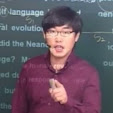All right, let’s start lesson no. 4. The fourth sentence structure is “S1이 V1할 때 S2가 V2합니다/했습니다.”, which means “When S1 V1 ~, S2 V2 ~”. As you can see, there are two subjects and two verbs in this sentence. And the letter, 때 functions as a conjunction, ‘when’ in English.
And 합니다 is the present tense form, and 했습니다 is the past tense form.
As you can see double ㅅ[si-ot], that is to say, ㅆ[ssang-si-ot] under 해, this final sound, which is also called 받침[bat-chim], represents the past tense.
OK, the schematic diagram is as follows.
1. 당신이 외로울 때 제가 당신 곁에 있어줄게요.
When you feel lonely, I will stay with you.
당신 is ‘you’, and 이 is the subjective case. 외로울 때 came from an adjective, 외로운, which means ‘lonely’. The final sound ㄴ under 우 has been replaced with ㄹ, and 때 is placed behind it, so 외로운 is changed into 외로울 때. All right, to sum up so far, 당신이 외로울 때 is the same as ‘When you feel lonely’. 제가 is ‘I’ as an honorific form of 내가. And 곁에 is ‘with’, and 있어줄게요 is ‘I will stay’.
So, 당신이 외로울 때 제가 당신 곁에 있어줄게요.
When you feel lonely, I will stay with you.
2. 당신이 저에게 전화했을 때 저는 샤워를 하고 있었습니다.
When you called me, I was taking a shower.
당신이 is ‘you’, and 저에게 is used as an object of the verb, 전화하다, which means ‘to call’, so 당신이 저에게 전화했을 때 is the same as ‘When you called me’.
And 저는 is ‘I’, and 샤워 is written as it sounds in English word, ‘shower’, and 를 is the objective case. By the way, 샤워하다 is ‘to take a shower’. And 샤워를 하고 있었습니다 is the past progressive tense form, so 샤워를 하고 있었습니다 is ‘was taking a shower’.
So, 당신이 저에게 전화했을 때 저는 샤워를 하고 있었습니다.
When you called me, I was taking a shower.
3. 해가 졌을 때 우리는 집으로 돌아왔습니다.
When the sun had set, we returned home.
해 is ‘the sun’, and 가 is the subjective case. 졌을 때 is composed of 졌다 and 때. 졌다 is the past tense form of 지다, which means ‘the sun sets’, and as I said, 때 is the conjunction, ‘when’, right? So, 해가 졌을 때 is the same as ‘When the sun had set’. 우리는 is ‘we’, and 집 is ‘home’, and 으로 is a kind of postposition representing direction. And 돌아왔습니다 is the past tense form of 돌아오다, which means ‘to return’.
So, 해가 졌을 때 우리는 집으로 돌아왔습니다.
When the sun had set, we returned home.
4. 당신이 한국어를 공부할 때 K드라마가 도움이 될 것입니다.
When you study Korean, K-dramas will be helpful.
당신이 is ‘you’, and 한국 is ‘Korea’, and the letter, 어 means ‘language’, so 한국어 is ‘Korean language’, right? 를 is the objective case, and 공부할 때 is also composed of 공부하다 and 때. 공부하다 is ‘to study’, and if you remove 다, and place the final sound ㄹ under 하, and place 때 behind it, that is to say, 공부할 때, this is the same as ‘when you study’. So, 당신이 한국어를 공부할 때 is ‘When you study Korean’ And 드라마 is written as it sounds in English word, ‘drama’, and 가 is the subjective case. 도움이 될 것입니다 can be divided into 도움이 되는 and ㄹ것입니다. The first is ‘helpful’, and the other is ‘will’. If you remove 는, and place the final sound ㄹ under 되, that is ‘will be helpful’.
So, 당신이 한국어를 공부할 때 K드라마가 도움이 될 것입니다.
When you study Korean, K-dramas will be helpful.
5. 제가 길을 걷고 있을 때 저는 저의 친구 중의 한 사람을 만났습니다.
When I was walking on the street, I met a friend of mine.
제가 is ‘I’, and 길 is ‘street’, and 길을 걷다 is ‘to walk on the street’, but 길을 걷고 있을 때 is the past progressive tense form, ‘was walking on the street’, so 제가 길을 걷고 있을 때 is ‘When I was walking on the street’. 저는 is ‘I’, and 저의 is ‘my’, 친구 is ‘friend’. And 중의 is ‘among’, and 한 is ‘one’, and 사람 is ‘person’, but if we combine these words, that is to say, 저의 친구 중의 한 사람 can be expressed as ‘a friend of mine’ in English, right?
And 을 is the objective case, and 만났습니다 is the past tense form of 만나다, which means ‘to meet’.
So, 제가 길을 걷고 있을 때 저는 저의 친구 중의 한 사람을 만났습니다.
When I was walking on the street, I met a friend of mine.







0 Comments